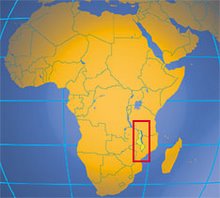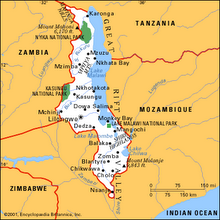I’ve had some questions recently about what exactly I’m doing at work so I thought I’d try to clarify a few things here. In Machinga, I’m working with a partner of WaterAid’s. WaterAid itself does not undertake the implementation of projects, but instead, serves as a funding agency providing technical and other support to local NGO’s responsible for project implementation. The rationale is that by working with local NGO’s, we are building the capacity of these organizations to implement similar projects, assisting them also with identifying other funding opportunities outside of WaterAid, therefore, in the future, these organizations should be able to function independently. The organization I work with here is called Target National Relief and Development (TANARD). In Machinga, TANARD is responsible for the rehabilitation of two gravity fed water schemes, as well as the working towards increased sanitation and hygiene education in the beneficiary communities. In all water projects, there must be an element of sanitation and hygiene as the full health benefits of providing clean water can not be achieved without the associated hygiene education. For example, if clean water is being provided, but collected in unclean buckets or food is being prepared without clean hands, etc., the full benefits of the water will not be realized.
Day to day we are undertaking a number of different activities. We work very closely with community management committees as well as the district government (which is roughly equivalent to the municipal government back home). The purposes of these collaborations are many. The government of Malawi has a very strong decentralization policy, on the basis that local government and communities are the most knowledgeable about the resources and needs in their areas. Within these two schemes as well as most water systems, the communities are responsible for the operation and maintenance of the system. Committees are set up on a number of levels. Tap Committees are set up for each tap (of which there are hundreds). These committees are responsible for collecting user fees from the beneficiaries and reporting any required maintenance. The schemes are divided into several sections that each has a committee. These Section committees are responsible for the overall coordination of the system in their section. In addition, each section has a Repair Team, made up of individuals trained in the maintenance and the system, who are dispatched when problems are reported. There is also an overall Main Committee who looks at the system as a whole, investigates opportunities for expansion and works to develop solutions to challenges within the system such as vandalism and low community participation.
The district government is responsible for the overall development of the district, including water and sanitation. Given the current capacity of the government, however, they are responsible for so many other areas, that they rely on local NGO’s to assist in the implementation of various projects. Their involvement, however, is paramount as ultimately, the development that occurs within their area is their responsibility. This has been a problem with other NGOs in the past that do not work through the government, therefore, government is unaware of their activities which often leads to duplication or the implementation of projects that are unnecessary or not coordinated well with other development in the area. For instance, we are working to rehabilitate two of the gravity fed systems but if another NGO begins to drill boreholes in the same area, this will have a significant impact on our project success.
On a daily basis we are undertaking a variety of activities. We are currently supervising the construction of 60 tap aprons. These concrete platforms serve to protect the area around the tap from contamination and divert waste water away from the area. In this activity we are working with local contractors, therefore, we are also trying to forge relationships and develop the capacity of the private sector in water service provision. We are also working with local masons in the construction of concrete latrine slabs. Many communities, if they have latrines, have latrine floors constructed of hardened dirt. Due to the soil conditions, however, these are prone to collapse. Concrete slabs are more durable and can be reused on a new latrine if the existing one becomes full. We are also promoting the construction of ecological sanitation latrines as an alternative to the traditional types. These latrines have two pits, one of which is used at a time. When the pit becomes full, the other pit is used and the contents of the first pit are left for 6 months after which can be harvested and used as fertilizer on crops, similar to manure. This has seen to be very successful in some communities but not in others often due to cultural or religious differences. We are also supervising the communities in trench digging and pipe laying for system expansion or the rehabilitation of some portions of the scheme that have historically not been performing well. We work with local bands to develop songs promoting hygiene and sanitation messages and then organize band performances in various beneficiary communities. We assist in the planting of trees around the system river catchments and help in disseminating environmental education to communities living near the source waters, to help combat soil erosion and other environmental degradation that is threatening the quality of the source water. We undertake household sanitation and hygiene surveys to identify the current sanitation and hygiene practices and assist in the development of our sanitation and hygiene education programs. We also assist the communities in providing technical or management assistance where required. All this, just to name a few! So it’s quite an exciting project with many facets. There are many challenges, both internally to the organization in terms of logistics, etc. as well as in working with the communities but perhaps I’ll leave those for another entry. Hopefully this gives you a better idea of what I’m working on day to day.
Monday, September 24, 2007
Subscribe to:
Post Comments (Atom)



2 comments:
well.... nice to see what you were doing in September! Hopefully by the end of this pot of coffee, I'll be caught up to your Christmas post....by the way, what was it like away from Canada during the holiday season?...
Do you have copy writer for so good articles? If so please give me contacts, because this really rocks! :)
Post a Comment